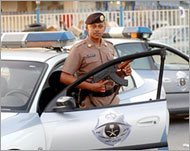Saudi women journalists battle on
Female journalists in Saudi Arabia are gaining a reputation for tenacity as they struggle against the kingdom’s many restrictions on women.

Saudi Arabia is one of the most constraining places in the world for women. Women cannot drive cars and when in public they must be accompanied in by male relatives and wear anonymous black robes.
But despite these limitations, the few women who have taken advantage of King Abdullah’s tentative liberalisation of Saudi society to venture into the media industry have won praise for their tenacity and professionalism.
A young print journalist in the capital Riyadh, who declined to be named, said female journalists had a lot of strengths that outsiders might not expect.
“I want to speak out. The problem is we don’t have media departments at university for women. But you need to know how to write and I don’t have the tools,” she said.
The journalist, who hails from Saudi’s less restrictive Eastern Province on the Gulf coast, said her family supported her ambitions but that Saudi society made it difficult to work.
Morality police
“Media means working evenings. You can’t do interviews except in your office, and if you go to a hotel lobby, it’s a crime,” she said, recounting how a female colleague was hauled off by the Saudi morality police for interviewing an unrelated man.
“You have to find safe ways. I have to be really careful. In Saudi Arabia, every one is watching you.”
|
“I have to be really careful – in Saudi Arabia, everyone is watching you” A Saudi woman journalist |
The religious police, who believe women should cover their entire faces, can cause problems for a woman taking the pulse of public opinion on the street.
Seating arrangements also separate women journalists from men at news conferences.
Adlah, a photographer and journalist in the Saudi capital, Riyadh, said she usually gets a positive response from Saudis she interviews while walking around malls, although suspicion surrounds these places since they are seen as fertile flirting grounds.
Sitting down to interview men is also a problem, as cafes are closed spaces and her family would be upset if she interviewed men there, Adlah said.
The relative privacy of a mall is no better. “[People] think, ‘What’s he going to buy you?'”
Tackling issues
In Jeddah, Saudi Arabia‘s slightly less conservative second city of 2.5 million people, women have made a name for themselves on English-language papers as well as some Arabic dailies.
“The girls don’t have any fears. They were told the first day that it’s not an easy job,” said Sabria Jawhar, Jedda bureau chief of the Saudi Gazette.
“It’s a matter of will power – they will find a way if they really want to.”
 |
|
Saudi women journalists have |
Jawhar’s team of young female reporters has gained access to stories that men would be afraid to touch.
They have covered issues like prostitution among foreign workers in a country where such activities can result in public flogging.
“We found that what we write is actually read. You feel proud of yourself when you tackle an issue that people were afraid to talk about,” said Shroog Radain, one of Jawhar’s staff of women reporters.
“But we are a tabloid, it’s easy for us to write here at the Saudi Gazette. It’s harder in the Arabic press.”
Changing face
Saudi television is also trying to present a modern face, employing women as newscasters and as hosts of day-time chat shows – something unheard of just a few years ago.
“Ten years ago, when I started, people used to be surprised if a woman journalist turned up to report anywhere,” said Rima al-Shamikh, a news anchor with al-Ikhbariya who reported from the field during the violent campaign launched by al-Qaeda sympathisers in 2003 to bring down the Saudi monarchy.
|
“People used to be surprised if a woman journalist turned up to report anywhere” Rima al-Shamikh, |
Shamikh’s job is all the more sensitive because she hails from one of Saudi Arabia‘s most prestigious clans.
“It was difficult to be a journalist or appear on television because I am from the Enaza tribe. They tried to say I was Palestinian or Lebanese, to deny that I was Saudi,” she said.
“The atmosphere is ready now, but women should only get into this profession if they love it. It’s not a profession that brings a lot of money. I have no social life and hardly see my children, but I love the profession.”